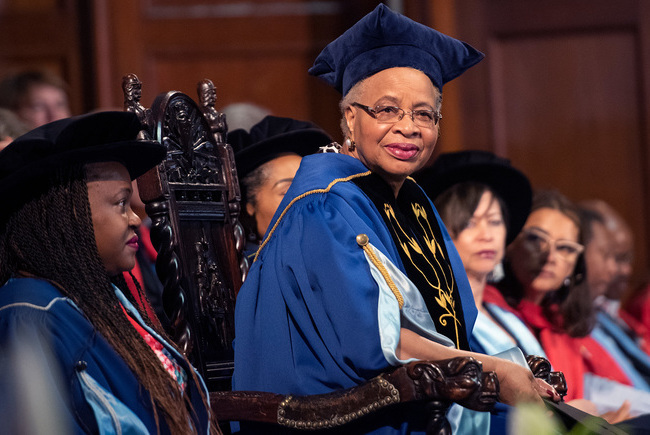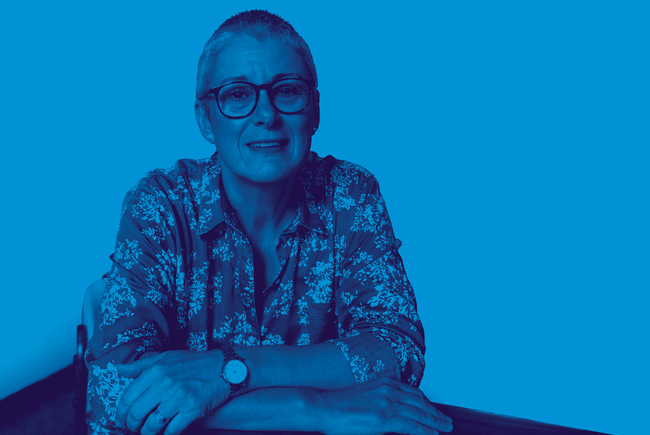Vice-Chancellor’s introduction
21 September 2020 Read time 4 min.
Whether you call it change, transformation or disruption, it’s the only constant in life. When our students went into protests in recent years, they disrupted the university, becoming a catalyst for accelerating the transformation of our institution. They forced us to examine the assumptions we make about ourselves and others, assumptions that often limit what we can achieve. I believe that it is the job of higher education to disrupt. We have to take ownership of change by becoming something different, creating something new, for our own good and for that of our society. These opportunities present themselves all the time; what’s difficult is putting them to good use. Our focus at UCT continues to be the development of students; they are the ones who see the necessity and benefits of change and remain agile and grab the opportunities that this increasingly technological and constantly changing world offers us.
In 20 years, many of the students who started university in 2019 will find themselves in leadership positions. Graduates trained with the necessary skills – creativity, flexibility, problem-solving, emotional intelligence, critical thinking and the ability to see the big picture beyond every short-term problem – will be able to respond effectively to unexpected challenges and will help to develop this continent. As a leading research university that excels at teaching and learning, UCT remains committed to being the best university in Africa and the best for Africa.
At the end of 2018 I instituted the Futures Think Tank, led by Professor Alison Lewis, dean of Engineering & the Built Environment. This team of forward-thinking minds representing different disciplines from across UCT devoted 2019 to discussing one pivotal question: “How should UCT and the way we do our work change to shape, lead and make the future in this rapidly changing world?”
“How should UCT and the way we do our work change to shape, lead and make the future in this rapidly changing world?”
UCT’s response is a commitment to unleashing the potential within each of us to create a fair and just society for all. This is a logical extension of our mission of the past two decades – to use education to create socially responsive change that improves lives. We believe that leadership in the Fourth Industrial Revolution must include such a commitment to social responsiveness so that the technologies of the future can meet the real-world needs of the poor and marginalised in Africa and around the world.
2019 introduced a new focus on environmental sustainability, both in terms of the university’s ambitions of being a green campus and in terms of teaching, research and governance. It’s about water and energy efficiency, human health, green investment and good citizenship. UCT’s draft environmental sustainability strategy includes achieving net zero water, net zero waste and net zero carbon by 2050 – incredibly ambitious goals in the African context.
Over the past year, UCT has taken further steps towards making our campus a more inclusive space. This is a work in progress, and we realise that building a community that brings together people representing so many backgrounds, cultures, sexual identities, languages and experiences requires thoughtful care. It has been heartening to see all the university initiatives that are working towards transforming our university and our society.
The changes we want to see in our world require decisive, courageous and inspirational leadership. In December 2019 we bid a loving farewell to our former chancellor, Mrs Graça Machel, whose warm strength continues to steer us as a university. In 2020 we welcome our new chancellor, Dr Precious Moloi-Motsepe, who sets a dynamic example through her commitment to service, philanthropy and building “Brand SA”.
The ongoing support of our staff and our students is invaluable. On behalf of UCT, I thank you for being such a strong part of our community. UCT is what it is because of your hard work and commitment!
Professor Mamokgethi Phakeng
Vice-Chancellor
 This work is licensed under a Creative Commons Attribution-NoDerivatives 4.0 International License.
This work is licensed under a Creative Commons Attribution-NoDerivatives 4.0 International License.
Please view the republishing articles page for more information.

Cover image: Spurred on by the death of UCT student Uyinene “Nene” Mrwetyana, UCT staff and students coalesced on Parliament in protest of increasing sexual and gender-based violence in the country.
Year in Review 2019

Graça Machel, Chancellor from 1999 to 2019, writes a message of welcome.
21 Sep 2020 - 2 min read
Q&A with Professor Loretta Feris, Deputy Vice-Chancellor: Transformation
21 Sep 2020 - >10 min read
Q&A with Associate Professor Lis Lange, Deputy Vice-Chancellor: Teaching and Learning
21 Sep 2020 - >10 min read
Previous Editions




The Newsroom and Publications unit releases an annual report, which is a review of activities on campus during the previous year. It spans nearly all aspects of UCT life; and includes reports from senior executives on issues such as governance, teaching and learning, research, social responsiveness, transformation and employment equity. Each year the report illustrates clearly why UCT is held in such high regard in South Africa, Africa and across the globe.





















